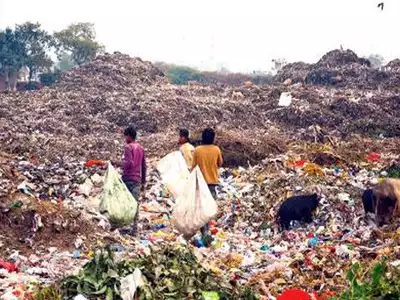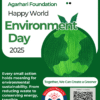
The Plastic Waste Obsession: A Smokescreen for a Bigger Crisis?
In the battle against environmental degradation, plastic waste has taken center stage. Governments, corporations, and environmental organizations rally against it, framing plastic as the ultimate villain of pollution. But while plastic waste is undoubtedly a problem, why is it the only household waste component receiving such overwhelming attention? What about the other categories of waste that are just as hazardous—if not more?
The Overlooked Giants of Household Waste
Beyond plastic, there exists a staggering variety of waste materials that pose severe threats to human health and climate stability. These include:
- Rubber & Leather: Industrial byproducts that take decades to decompose and often release harmful chemicals.
- Textiles (Natural & Artificial): Millions of tons of fabric waste—laden with dyes, microfibers, and synthetic blends—end up in landfills and water bodies every year.
- Paper & Wood: While biodegradable, their excessive production leads to deforestation, habitat destruction, and significant carbon emissions.
- Chipboard & Fiberboard: Treated with adhesives and synthetic resins, these materials release toxic compounds when decomposing or burned.
- Tetra Pak & Laminated Materials: Designed for convenience, these packaging materials are nearly impossible to recycle effectively.
- Hospital Waste: Discarded syringes, medical instruments, and contaminated disposables that can spread diseases and leach dangerous substances.
- Sewage Sludge: A byproduct of wastewater treatment, this waste can contain heavy metals, pharmaceuticals, and pathogens.
Despite their alarming presence in landfills and water bodies, these categories are largely ignored in mainstream waste management discourse. Why?
The Plastic Waste Mafia: A Global Black Market
One possible explanation is the existence of a giant, uncontrolled, and highly lucrative market for plastic waste. Under the pretense of environmental responsibility, plastic waste is traded across borders, often ending up in countries with lax regulations.
- Unregulated Recycling: Millions of tons of plastic waste are exported to developing nations under the guise of recycling, only to be dumped or burned illegally.
- Corporate Greenwashing: Companies push plastic recycling narratives while continuing to produce vast amounts of single-use plastics, knowing full well that only a fraction gets properly recycled.
- Criminal Networks: Illegal plastic waste trafficking is a growing industry, with reports of forged recycling certifications, mis declaredshipments, and environmentally devastating disposal methods.
A Greater Threat to Human Health & Climate Change
The unchecked proliferation of all waste types—not just plastic—poses an existential crisis:
- Toxic Emissions: Incineration of mixed waste, including rubber, textiles, and hospital waste, releases carcinogens and greenhouse gases.
- Microplastics & Chemical Leachates: Contaminated landfill runoff pollutes soil and water, making its way into food chains.
- Deforestation & Resource Depletion: Paper, wood, and chipboard industries fuel large-scale habitat destruction and biodiversity loss.
- Public Health Hazards: From the spread of infectious diseases through medical waste to respiratory illnesses caused by burning mixed waste, the risks are immense.
The Role of Waste Management in Aesthetics and Tourism
Waste management is crucial for maintaining the aesthetics and appeal of a city, especially in terms of tourism. No one wants to visit a destination plagued with litter and garbage.
Effective waste disposal ensures that streets, parks, and public spaces are clean and free from unsightly trash, enhancing a city’s overall beauty and attractiveness. This not only pleases tourists but also creates a positive image, encouraging more visitors and boosting the local economy.
By prioritizing trash management, cities can preserve their natural landscapes and cultural heritage, making them more desirable tourist destinations.
Compliance With Regulations
Compliance with regulations is another crucial aspect of waste management. Strict rules and regulations are in place to ensure the proper disposal and handling of waste materials.
Failure to comply with these regulations can result in hefty fines and legal consequences. It is essential to prioritize compliance to maintain a clean and sustainable environment for future generations.
Climate Change Mitigation
Climate change mitigation is a pressing global issue, and waste management is crucial. Improper waste disposal methods release greenhouse gases, such as methane, which significantly contribute to the potential effects of climate change.
Implementing effective waste management strategies, such as recycling, composting, and proper landfill practices, can reduce these emissions and help mitigate climate change.
By diverting waste from landfills and adopting more sustainable practices, we can minimize our carbon footprint and work towards a cleaner and greener future. Proper trash management is essential for achieving climate change mitigation goals.
Future Sustainability
One of the key reasons why waste management is important is because it ensures future sustainability.
Proper waste management practices help to conserve resources and minimize environmental impact. By properly managing waste, we can prevent the depletion of natural resources, reduce pollution, and protect the health of our ecosystems.
By implementing effective trash management strategies today, we can create a more sustainable future for future generations. Our responsibility is to make conscious choices about how we dispose of our waste to preserve our planet for future generations.
The Need for a Holistic Approach
Focusing solely on plastic waste allows industries and policymakers to conveniently ignore broader environmental crises. A true waste management revolution demands:
- Comprehensive Waste Categorization & Treatment—Beyond just plastic, all forms of hazardous waste must be addressed with equal urgency.
- Stricter Global Regulations—Preventing the illegal trade and improper disposal of waste.
- Consumer Awareness & Corporate Accountability—Shifting the burden from individuals to industries that perpetuate the waste problem.
- Sustainable Product Design & Circular Economy—Developing alternatives that minimize waste generation at the source.
Conclusion
The selective demonization of plastic waste while ignoring other toxic waste streams is no accident. It is a deliberate misdirection that benefits corporations, criminal networks, and complicit governments. If we truly want to combat pollution and climate change, we must dismantle the entire unsustainable waste system—not just the part that makes for convenient headlines.





